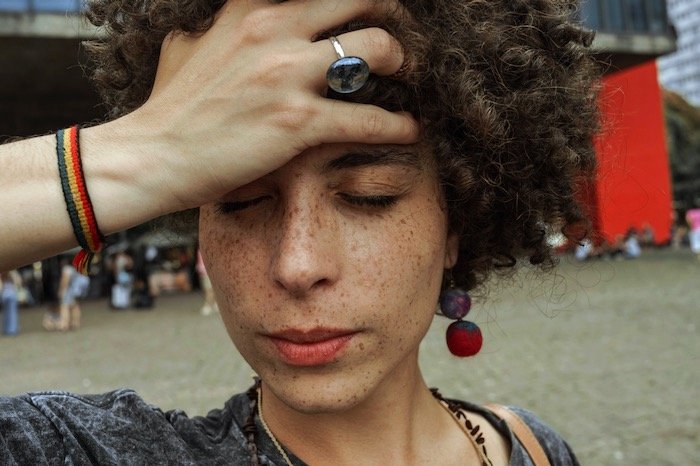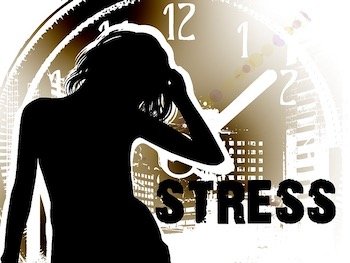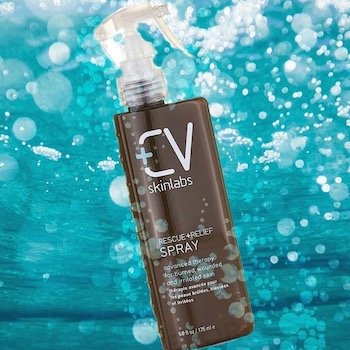
The idea of stress-induced acne makes complete sense to some people, and not so much to others.
For years, scientists didn’t think that stress-induced acne was a real thing. They pointed instead to changes in the skin that cause acne such as inflammation, bacteria, and the like.
Now we know, however, that there is a strong brain-skin connection, and that our thoughts and feelings can have a big impact on the health of our skin. (See our post, “What You Need to Know About Mental Health and Skin.”)
So how do you know whether today’s breakup was caused by yesterday’s stress, or by something else entirely?
Stress-Induced Acne is Just One Type of Acne
We do have evidence that stress can cause acne. In a 2017 study of nearly 150 women, for example, scientists found that increased stress was strongly correlated with greater acne severity.
In an earlier study of students with acne, researchers again found a strong correlation between stress levels and the severity of acne, and in a third study, they found the same thing—patients with acne experienced a worsening of the acne during stressful periods.
As to why this happens, scientists are looking into it. They thought that stress increased the production of skin oils, but studies on that have been mixed. Another possibility—stress can trigger nerve signaling in the skin that causes itch, causing people to scratch and pick at their skin. This introduces bacteria into the pores, which can lead to acne breakouts.
Scientists also know that chronic stress depresses the immune system. That means the skin will take longer to heal, and acne breakouts may stick around longer.
There’s more to it, though, including that brain-skin connection and the fact that the skin has its own immune system.
 How Stress-Induced Acne Works
How Stress-Induced Acne Works
When you feel stressed, the body releases stress hormones like cortisol and adrenaline into your body. Cortisol is known to increase oil production in your skin glands, which we know can increase the risk of clogged pores and breakouts.
Stress also triggers a response from the immune system. When cortisol is released, it encourages the release of pro-inflammatory cells in the skin itself. This is because the skin contains immune cells that help fight off infections and protect you from pathogens. (Read our post, “Why the Immune System In Your Skin Needs Your Help.”)
When everything is well and you’re feeling strong and healthy, the immune system in the skin is strong and protective. It helps keep you safe from infections and diseases, including skin cancer.
But when you’re stressed—particularly if you’re chronically stressed—things can go wrong. The skin’s immune system, in response to stress hormones, releases inflammatory cells, and we already know that inflammation plays a large role in acne.
In a 2013 review, scientists gathered evidence showing that acne “is primarily an inflammatory disease…” Harvard Health agrees, stating that acne is “caused by inflammation in the pilosebaceous unit, the place that harbors the hair follicle and the sebaceous [oil] gland.”
Scientists used to think that inflammation was a secondary factor in acne, but in some circles, that’s changing. In a 2013 study, for instance, researchers noted that though inflammation has long been recognized as important in acne, “until recently it was considered a secondary event.”
They go on to state that more recent studies have demonstrated “a central role for inflammation in the development of acne lesions,” which we can interpret to mean that stress, too, may have a more central role.
Stress-Induced Acne Isn’t the Only Kind
Despite all the evidence showing that stress can, at the very least, make acne worse, it’s not the only thing that can lead to a breakout.
Acne can be related to other factors as well, including:
- Diet—We have evidence that a diet high in fast foods can exacerbate inflammation and lead to more acne breakouts. There are also studies linking the intake of dairy foods with acne in people sensitive to dairy.
- Hormones—There’s a reason why adolescents, women going through their menstrual period, and women going through menopause are more likely to struggle with acne. That reason is hormones. Scientists know that hormonal changes can trigger an increase in acne breakouts.
- Skin care products—Some skin care products can clog pores, increasing the risk of acne.
- Medications—Some medications like steroids, lithium, and some drugs used to treat epilepsy may have acne as a side effect.
- Masks, headbands, and more—Regularly wearing items that put pressure on the skin while potentially exposing it to more bacteria can cause breakouts.
How to Tell if It’s Stress-Induced Acne
Below are five ways to tell whether your acne is related to stress or something else.
 1. The Timing
1. The Timing
When did you break out? Think back. If you just experienced a really stressful event—or if you’ve been stressed for a while—your acne is likely to be connected to that stress.
Action step: Practice regular stress relief. Exercise every day, journal, meditate, go for a walk, spend time with a good friend, and engage in other activities that help your stress melt away. If the stress is likely to continue, ask your doctor about taking a stress-relieving supplement like ashwagandha, L-theanine, magnesium, Rhodiola, and lemon balm.
For your skin: Every day, spritz on some of our Rescue + Relief Spray. It has key inflammation-reducing ingredients like turmeric and valerian, along with natural moisturizers that will help your skin cope with the stress, but it won’t clog your pores.
2. The Location
Where are your pimples showing up? This may also give you a clue into what’s causing them. If you regularly suffer from breakouts around your chin during your menstrual period, for example, your acne is more likely hormone-related.
Stress acne, on the other hand, is most likely to show up in the oiliest areas of your skin—typically, the T-zone.
Action step: Take steps to reduce your stress and reduce the excess oil in your T-zone. Use a cleanser that is made for oily skin—a foam or gel cleanser is best. If your cheeks are usually dry, use the oily skin cleanser only in the T-zone, and stick with your creamier cleanser for your cheeks and other dry areas.
It can also help to use a clay mask 1-2 times a week in those oily areas to help soak up the excess oil.
3. Other Symptoms
What other symptoms are you noticing along with your acne? If it’s just the pimples alone, it’s probably not stress acne. But if you also see dilated pores, shininess, blackheads, and whiteheads, stress may be damaging your skin.
Action step: Use a product with salicylic or glycolic acid in it. These are gentle acids that will help exfoliate the skin, clear the pores, and even help the pores to look smaller.
4. Inflammation and Itch
Though acne is always accompanied by inflammation, stress acne is likely to have more visible inflammation and itch associated with it. You may notice the redness more, or feel like you have to scratch your skin more often.
Action step: Hit your skin with a double whammy of anti-inflammatory ingredients. Start by using Rescue + Relief as your toner, then follow with our Calming Moisture. Both have our exclusive Tri-Rescue Complex, a powerful anti-inflammatory, plus other calming ingredients like aloe, comfrey, and sunflower oil. Our Calming Moisture also contains oat extract to tame the itch.
Do you have stress-induced acne?
Photo by Claudia Barbosa from Pexels.

